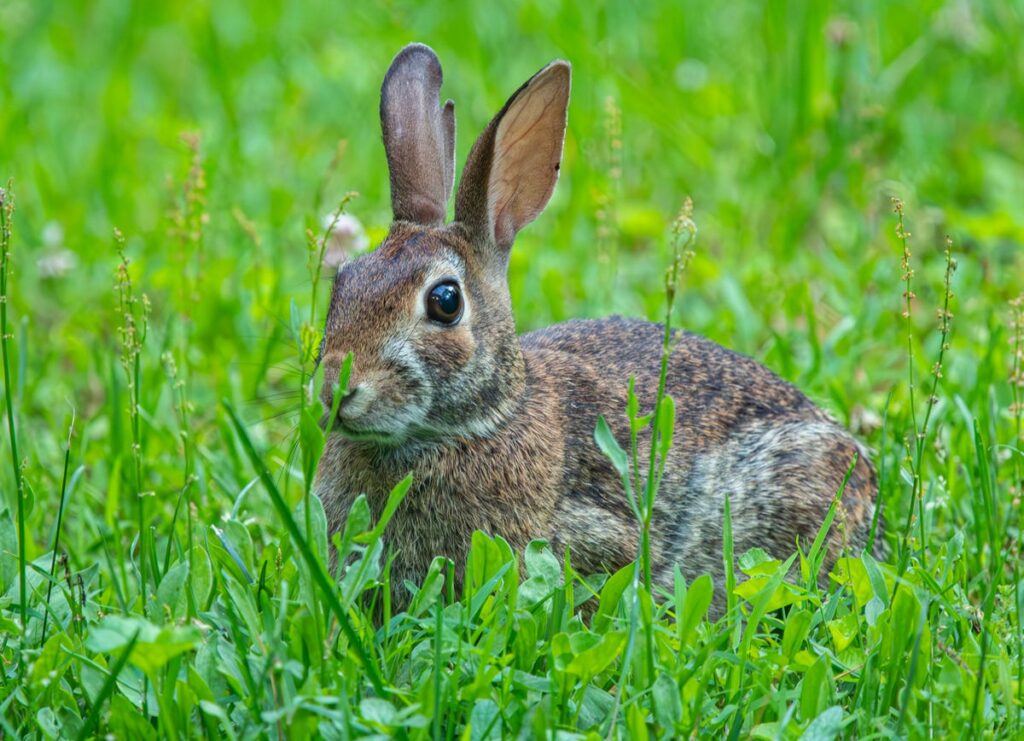Why do rabbits spray urine?

Among the many intriguing habits exhibited by rabbits, one that might raise eyebrows is their tendency to spray urine. This behavior, more commonly associated with territorial marking in other animals, serves various purposes in the rabbit world.
Communication Through Scent
Rabbits, by nature, are creatures that heavily rely on non-verbal communication, and one of the primary mediums through which they convey information is scent. Unlike humans who communicate through spoken or written language, rabbits have evolved a sophisticated olfactory language that involves the use of scent-marking, particularly through urine spraying.
Rabbit Olfactory Prowess
The rabbit’s sense of smell is exceptionally developed, surpassing even their keen hearing. This heightened olfactory sense allows them to discern a myriad of scents in their environment, and they use this ability not only for survival but also for intricate social interactions.
The scent glands located beneath a rabbit’s chin and around its anus are crucial in emitting pheromones, chemical compounds that carry information about an individual rabbit’s identity, reproductive status, and emotional state.
Social Hierarchy and Dominance
Within a group of rabbits, whether in the wild or in a domestic setting, a social hierarchy inevitably forms. Unneutered or non-spayed rabbits, in particular, are prone to asserting dominance through urine spraying.
The act of marking with urine is a clear communication of status, with the more dominant rabbit establishing its presence and delineating its territory. Understanding this aspect of rabbit behavior is crucial for those who keep rabbits as pets, especially if they plan to house multiple rabbits together.
Maternal Communication
In addition to territorial marking, rabbits employ urine spraying as a means of maternal communication. Mother rabbits may mark their nests with urine, creating a distinct scent profile that helps their offspring recognize the nest and navigate their surroundings. This form of communication aids in the survival of the young, as it establishes a secure and identifiable home base.
Community Integration
In situations where rabbits cohabitate, such as in colonies or groups, urine marking is a way for individuals to integrate into the community. Each rabbit contributes its unique scent, fostering a communal scent profile that helps in recognizing members of the group. This communal scent can create a sense of belonging and unity among the rabbits, facilitating smoother social interactions within the group.
Establishing Territory
Territorial behavior is deeply ingrained in the nature of rabbits, whether they are living in the wild or as domestic companions.
Rabbits in the Wild
In their natural habitats, wild rabbits exhibit highly organized social structures centered around the establishment and defense of territories. These territories serve as crucial spaces for foraging, breeding, and seeking refuge from predators.
The act of urine spraying becomes an essential tool in this dynamic, as rabbits release pheromones through their urine to communicate the boundaries of their domain to other rabbits in the vicinity.
Male rabbits, especially, are predisposed to engage in territorial marking as a display of dominance and to attract potential mates. The sprayed urine not only signals the presence of the marking rabbit but also conveys information about its reproductive status and overall health.
This communication is vital in preventing unnecessary confrontations between rabbits, as it helps them recognize the territorial limits and avoid potential conflicts.
Domestic Rabbits
In the domestic setting, the territorial instincts of rabbits remain intact, albeit in a modified form. Unneutered or non-spayed pet rabbits are more prone to engaging in urine spraying as a way to assert dominance and establish their territory. This behavior can manifest in both males and females, although it tends to be more pronounced in intact males.
When introducing a new rabbit into a household, the resident rabbit may intensify urine marking as a response to the perceived intrusion. This is a natural reaction driven by the instinct to protect their established territory. Understanding this behavior allows rabbit owners to implement strategies to ease the introduction process and mitigate potential conflicts between the resident and new rabbits.
Territorial Disputes
Territorial disputes among rabbits can arise, particularly in multi-rabbit households or when unfamiliar rabbits are introduced. These disputes may manifest as aggressive behavior, vocalizations, and increased urine spraying. It’s essential for rabbit owners to monitor their pets closely during these times and provide ample space and resources to minimize the potential for conflicts.
Neutering and Spaying
One effective strategy to manage territorial marking in pet rabbits is through neutering (for males) or spaying (for females). These procedures not only contribute to population control but also significantly reduce the influence of sex hormones that drive territorial behaviors.
Neutered or spayed rabbits are generally less inclined to engage in excessive urine spraying, making the household environment more harmonious.
Reproductive Signaling
Urine spraying also plays a significant role in the realm of rabbit reproduction. Male rabbits, in particular, are notorious for spraying urine to attract potential mates and communicate their readiness for mating.
The pheromones present in the sprayed urine signal reproductive receptivity and fertility, serving as a form of courtship behavior. This behavior becomes more pronounced during the breeding season, highlighting the intricate ways in which rabbits navigate the complexities of reproduction.
Hormonal Influence
The reproductive signaling behavior in rabbits is intricately linked to hormonal changes, particularly in male rabbits. The onset of the breeding season triggers an increase in testosterone levels, influencing both physical and behavioral changes. As a result, male rabbits become more prone to urine spraying as a means of advertising their presence and fertility.
Scent Pheromones
Urine, laden with scent pheromones, becomes a powerful tool for male rabbits seeking to communicate their reproductive status. These chemical signals convey information about the rabbit’s health, genetic fitness, and receptivity to mating. In the wild, this scented announcement not only attracts potential mates but also serves as a deterrent to rival males, signaling the territory is already claimed.
Courtship Rituals
Urine spraying is often accompanied by other courtship rituals, creating a complex communication dance between potential mates. Male rabbits may engage in behaviors such as chin rubbing, grooming, and gentle nudges to further express their interest and readiness for reproduction. The combined effect of these behaviors establishes a nuanced system of communication that facilitates successful mating in the wild.
Female Response
Female rabbits, in turn, are equipped to interpret these scent signals. They may respond to the pheromones in a male’s urine by exhibiting receptive behaviors, such as increased grooming, circling, and positioning themselves in a way that signifies their readiness to mate. This intricate interplay of scent communication ensures a synchronized courtship between male and female rabbits, contributing to the reproductive success of the species.
Stress and Anxiety
While urine spraying is often associated with positive communication, it can also be indicative of stress and anxiety in rabbits. Changes in the environment, the introduction of new rabbits, or disruptions to their routine can trigger this behavior. In such instances, rabbits may spray urine as a way of expressing discomfort or attempting to establish a sense of control in their surroundings.
Rabbits, being highly sensitive creatures, can experience stress due to changes in their environment, social dynamics, or disruptions to their routine. Understanding the nuances of how stress contributes to urine spraying is crucial for rabbit owners seeking to provide optimal care for their furry companions.
Rabbit Responses to Stress
Rabbits, as prey animals, are evolutionarily wired to be alert and responsive to changes in their surroundings. When confronted with stressors, whether it be a sudden loud noise, an unfamiliar scent, or the presence of a perceived threat, rabbits may exhibit a range of stress responses. These can include increased heart rate, rapid breathing, thumping hind legs, and, notably, urine spraying.
Environmental Triggers
Changes in the environment can be significant stressors for rabbits. These changes may include alterations to their living space, such as rearrangement of furniture, introduction of new objects, or even a change in the location of their food and water bowls. New smells, unfamiliar sounds, or the presence of other animals can also trigger stress in rabbits, prompting them to resort to urine spraying as a coping mechanism.
Social Dynamics
Rabbits are inherently social animals, and disruptions in their social dynamics can induce stress and anxiety. The introduction of a new rabbit into their living space or changes in the hierarchy within a group can be particularly stressful events. In response to such social upheavals, rabbits may mark their territory more vigorously through urine spraying, attempting to assert control and reaffirm their place within the group.
Health Issues
It’s essential to consider that stress-induced urine spraying can sometimes be indicative of underlying health issues. Physical discomfort or pain can amplify stress in rabbits, leading to increased marking behavior. Owners should be vigilant in observing other signs of distress, such as changes in eating habits, lethargy, or altered grooming behavior, to rule out potential health concerns contributing to stress.
Coping Strategies and Prevention
Understanding the reasons behind urine spraying in rabbits is essential for their proper care and well-being. In cases where stress is the root cause, providing a secure and stable environment can alleviate the need for excessive urine marking.
Neutering/Spaying
One of the most impactful interventions in managing urine spraying is the decision to neuter or spay rabbits. This surgical procedure not only curtails reproductive behaviors but also significantly reduces the hormonal influences that drive territorial marking. Neutering or spaying is highly recommended, especially for those who keep rabbits as pets, as it not only helps in preventing unwanted litters but also contributes to a more harmonious living environment.
Environmental Enrichment
Rabbits are intelligent and curious animals that thrive in environments that stimulate their minds and bodies. To discourage urine spraying resulting from stress or boredom, it is essential to enrich their surroundings.
This can be achieved by providing a variety of toys, tunnels, and chewing materials. Introducing new items regularly keeps their environment dynamic and prevents monotony, reducing the likelihood of stress-induced marking.
Secure and Comfortable Housing
Rabbits, whether indoors or outdoors, require secure and comfortable housing. Inadequate living conditions can contribute to stress and anxiety, leading to urine spraying. Ensure that their living space is spacious enough, well-ventilated, and offers places for them to hide or retreat when needed. Additionally, maintaining a clean living area is essential, as rabbits are more likely to mark in dirty or soiled spaces.
Socialization and Companionship
Rabbits are social animals that thrive on companionship. Introducing a compatible rabbit companion can alleviate loneliness and reduce the likelihood of stress-related behaviors, including urine spraying.
When introducing new rabbits, gradual and supervised interactions are key to establishing positive relationships. However, it’s essential to note that not all rabbits will get along, and careful consideration should be given to their personalities and temperaments.
Consistent Routine
Rabbits appreciate routine and predictability in their daily lives. Sudden changes or disruptions to their schedule can induce stress, leading to urine spraying. Establish and maintain a consistent routine for feeding, playtime, and interactions. This stability provides a sense of security for rabbits, minimizing stressors that might trigger territorial behaviors.
Veterinary Check-ups
Regular veterinary check-ups are essential for monitoring the overall health of rabbits. Health issues such as urinary tract infections or other medical conditions can contribute to changes in behavior, including urine spraying. A thorough examination by a qualified veterinarian can help identify and address any underlying health concerns, ensuring the well-being of the rabbit.










